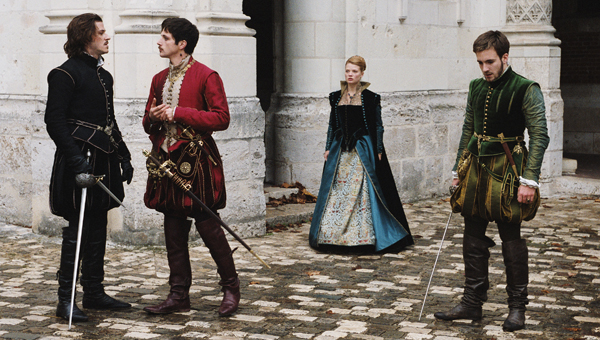The Princess Of Montpensier Review

What is it that you honour?
That’s the crux of this sprawling french drama based upon Madame La Fayette’s short story by the same name.
The Princess Of Montpensier is set in 16th Century France and the reign of King Charles IX. Religious wars rage throughout the country, and Bertrand Tavernier’s adaptation opens with a skirmish between two warring religious factions who, as it turns out believe in the same god.
Naturally, this isn’t enough to stop them slicing and dicing each other. So its nice to see that human inspires their zealots to kill as much in the olden days as the still do today.
One of the sides killing in someone else’s name consists of just two men; a skilled master and his young protégé. The elder soldier is the Count of Chabannes, an expert swordsman, scholar and apparent defector to the one true faith.
Whatever that is today.
After improbably defeating an entire barn of, well, not quite non believers, but you get the picture; Chabannes renounces the folly of both war and religion, forsaking both sides for the good of his soul.
Maybe they’ll start a new religion in his honour now, just to make their religious genocide even more nonsensical?
Probably not, as the inspiration for his lack of faith was a pregnant woman inadvertently receiving the sharp end of Chabannes sword in the skewering melee he and his apprentice meted out a bunch of farmers.
Having informed his student that they must go their separate ways, Chabannes quickly runs into trouble on his newly acquired solo travels; only for another former pupil of his to rescue him and offer him protection under his family’s flag.
This is Philippe, the Prince of Montpensier, and soon to be husband of the eponymous character in this entertaining french farce.
Philippe is on his way to meet his betrothed in a neighbouring province although, owing to his paterfamilias’ subterfuge, even he is unaware of this.
There’s just one hitch in his papa’s plan; said girl in question, the enchanting Marie de Mezieres, has already been promised to another.
One final glitch in this renaissance style matrix happens to be that Marie is madly in love with her originally betrothed’s brother; the rather dashing Duke of Guise, and he her.
Savvy?
Persuaded that marrying a man she’s not in love with is slightly better than marrying the younger brother of a man she is, Marie reluctantly agrees to this Prince of Montpensier, unsurprisingly given the name of the film, and rides off to her new life.
Having arrived at a rather under decorated and populated castle, her new husband is swiftly whisked away as war beckons once again. In his absence, Marie comes under the tutelage of Chabannes, who rather suddenly decides he quite fancies her too.
As if four suitors weren’t enough to turn a girl’s head, a fifth comes along in the shape of Duke of Anjou; a swaggering, metrosexual with eyeliner around his eyes and lust in his, ahem, thighs.
Spoilt for choice, the newly christened Princess of Montpensier spends her time fending off this cabal of Romeo’s advances, some a little less whole heartedly than others, but the question is can you ever deny your heart’s one true desire?
The Princess of Montpensier is an old school film made today. Director Tavernier adroitly mixes swordplay that’ll buckle your swash with authentic sets and 16th Century costumes, whilst never forgetting the real heart of this story; the many subtle differences between love and, well, not love.
The ensemble cast are effective and likable, particularly Melanie Thierry as Marie; the siren of Montpensier, who unwittingly seduces every man she meets.
Yet once this well conceived and executed film is over, it’s hard to escape the sense that this adaptation is irrelevant.
Much like one of today’s modern cowboy films, The Princess Of Montpensier feels as though it belongs to a different age.
As good as it may be, and The Princess Of Montpensier is a good film, a french period drama will struggle to find a place in 21st century cinema.
Today, we honour hollywood names and cgi special effects over sleight of sword and word.
C’est la vie.
Jonathan Campbell